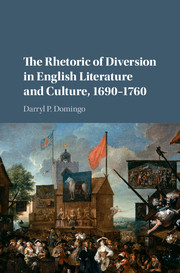Description
The Rhetoric of Diversion in English Literature and Culture, 1690–1760
Author: Domingo Darryl P.
A study of how literature of the early eighteenth century represented a newly fashionable life of amusement and diversion.
Language: EnglishApproximative price 101.56 €
In Print (Delivery period: 14 days).
Add to cart
The Rhetoric of Diversion in English Literature and Culture, 1690-1760
Publication date: 03-2016
316 p. · 16x23.5 cm · Hardback
Publication date: 03-2016
316 p. · 16x23.5 cm · Hardback
Approximative price 28.98 €
In Print (Delivery period: 14 days).
Add to cart
The Rhetoric of Diversion in English Literature and Culture, 1690-1760
Publication date: 12-2018
Support: Print on demand
Publication date: 12-2018
Support: Print on demand
Description
/li>Contents
/li>Biography
/li>
Why did eighteenth-century writers employ digression as a literary form of diversion, and how did their readers come to enjoy linguistic and textual devices that self-consciously disrupt the reading experience? Darryl P. Domingo answers these questions through an examination of the formative period in the commercialization of leisure in England, and the coincidental coming of age of literary self-consciousness in works published between approximately 1690 and 1760. During this period, commercial entertainers tested out new ways of gratifying a public increasingly eager for amusement, while professional writers explored the rhetorical possibilities of intrusion, obstruction, and interruption through their characteristic use of devices like digression. Such devices adopt similar forms and fulfil similar functions in literature as do diversions in culture: they 'unbend the mind' and reveal the complex reciprocity between commercialized leisure and commercial literature in the age of Swift, Pope, and Fielding.
'Unbending the mind': introduction by way of diversion; 1. 'The predominant taste of the present age': diversion and the literary market; 2. 'Pleas'd at being so agreeably deceiv'd': pantomime and the poetics of dumb wit; 3. 'Fasten'd by the eyes': popular wonder, print culture, and the exhibition of monstrosity; 4. 'Pleasantry for thy entertainment': novelistic discourse and the rhetoric of diversion; 'The soul of reading': conclusion by way of animadversion; Notes; Bibliography.
Darryl P. Domingo is Assistant Professor of English at the University of Memphis. His research focuses on the often subtle ways in which eighteenth-century cultural phenomena - such as urbanization, entertainment and advertising - both represent and are represented by the devices of literary texts. Darryl has published essays in such journals as Eighteenth-Century Studies, Eighteenth-Century Fiction, The Journal for Early Modern Cultural Studies, and The Review of English Studies.
© 2024 LAVOISIER S.A.S.





